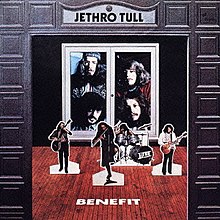Benefit (album)
| Benefit | ||||
|---|---|---|---|---|
 |
||||
| Studio album by Jethro Tull | ||||
| Released | 20 April 1970 (US) 1 May 1970 (UK) |
|||
| Recorded | December 1969 – January 1970 | |||
| Studio | Morgan Studios, London | |||
| Genre | Hard rock, folk rock, progressive rock | |||
| Length | 42:49 | |||
| Label |
Chrysalis/Island (Europe) Reprise (America, Japan and Oceania) |
|||
| Producer | Ian Anderson, Terry Ellis | |||
| Jethro Tull chronology | ||||
|
||||
|
Singles from Benefit |
||||
|
||||
| Professional ratings | |
|---|---|
| Review scores | |
| Source | Rating |
| AllMusic |
|
| Robert Christgau | B− |
| Record Collector |
|
Benefit is the third album by the British rock band Jethro Tull, released in April 1970. It was the first Tull album to include pianist and organist John Evan – though he was not yet a permanent member of the group – and the last to include bass guitarist Glenn Cornick. It was recorded at the same studio of the previous album, but the band experimented with more advanced recording techniques.
Singer Ian Anderson said that Benefit is a much darker album than the 1969 predecessor, Stand Up, owing to the pressures of an extensive U.S. tour and frustration with the music business.
Guitarist Martin Barre said that Benefit was a lot easier to make than previous albums, as the success of Stand Up allowed the musicians more artistic latitude.
Bassist Glenn Cornick stated that the band's intention was to capture a more "live" feeling as "I felt the last one sounded like a group of session musicians performing various songs. It was pretty cold."
Benefit incorporated studio techniques such as reverse recording (flute and piano tracks on "With You There to Help Me"), and manipulating the tape speed (guitar on "Play in Time"). In a 1970 interview Anderson noted that the addition of keyboardist John Evan had changed the band's style: "John has added a new dimension musically and I can write more freely now. In fact anything is possible with him at the keyboard".
Ian Anderson said that Benefit was a "guitar riff" album, recorded in a year in which artists like Cream, Jimi Hendrix and Led Zeppelin were becoming more riff-oriented. Anderson also noted that Benefit is "a rather dark and stark album and, although it has a few songs on it that are rather okay, I don't think it has the breadth, variety or detail that Stand Up has. But it was an evolution in terms of the band playing as 'a band.'" Overall, Anderson considered the album "a natural part of the group's evolution".
According to Martin Barre "To Cry You a Song" was a response to Blind Faith's "Had to Cry Today", "although you couldn't compare the two; nothing was stolen ... The riff crossed over the bar in a couple of places and Ian and I each played guitars on the backing tracks. It was more or less live in the studio with a couple of overdubs and a solo. Ian played my Gibson SG and I played a Les Paul on it."
...
Wikipedia
